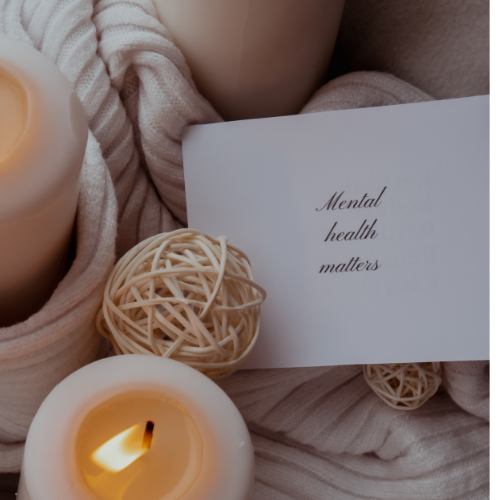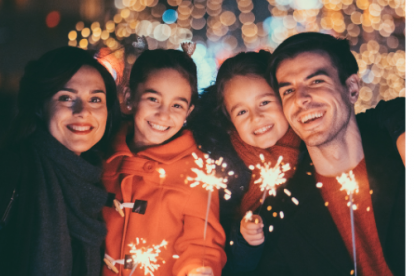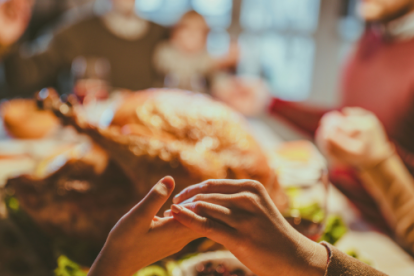Caring for Mental Well-being Throughout the Holiday Season

Mental health care during the holidays is essential. This time of year can trigger depression, anxiety, and a worsening of existing mental health symptoms. With so much to do and high expectations, stress can become overwhelming. Take time for self-care and watch out for others who may be struggling. Balancing seasonal events and tasks with appropriate mental health care is the key to not just surviving but thriving this year.
The holiday season, roughly from November through New Year’s Day, is supposed to be full of joy, celebration, and happy gatherings. For many people, this is the reality. For others, it’s a struggle just to get through these two months.
If you fit into the second group, you’re not alone. Even if you generally enjoy the holidays, the season doesn’t always go off without a hitch. Whether you have a diagnosed mental illness or not, pay attention to your mental health this time of year. Take time for self-care and keep an eye on loved ones who may be struggling.
The Impact of the Holidays on Mental Health
According to the National Alliance on Mental Illness, 64% of people say their mental illnesses worsen during the holidays. Nearly one-quarter report that their conditions get much worse. Don’t assume this only applies to people with diagnosed conditions. Many people experience mental health symptoms during this time:
- Three-quarters of survey respondents reported feeling sadder than normal over the holidays.
- Nearly 70% felt concerned about money and spending.
- More than half felt burdened by unrealistic expectations.
- Half of people were lonely and missed being with loved ones.
- Fifty-five percent of people felt sad when reflecting on happier past holidays.
The main underlying factor in holiday depression, anxiety, and other mental health challenges is stress. The added stress of the season can trigger or worsen symptoms and negative emotions. If you can identify, minimize, and cope with sources of stress this year, you can better manage your mental health.
Be Aware of How the Holidays Impact Your Mental Health
The first step in managing your mental health during a difficult time is awareness. Be conscious of how this time of year can be damaging for anyone’s mental health. Then consider what aspects of the season affect you specifically.
While many people find this to be an enjoyable time, a lot of us struggle. It’s not always easy to understand why a joyful time of year can be damaging, even for those who experience holiday blues. Here are some of the reasons the holidays cause a decline in mental health for some and possibly for you:
- High expectations. The expectations for the holidays can be unreasonable, from attending every event to feeling joy on command. You may set these for yourself or feel pressure from others. Not meeting expectations can lead to disappointment and depression.
- A packed schedule. In some ways, it can be nice to stay busy. A full calendar may distract you from grief or depression, but it can backfire. You may feel overwhelmed having so much on your to-do list.
- Loneliness. Some people find themselves more isolated during the holidays. If you can’t be with family or other loved ones, or if you lost someone you love, you may feel sad and lonely.
- Family gatherings. Getting together with family can be an added stress for many people. This may be true for you if there are unresolved conflicts, past trauma, or other relationship issues in your family.
- Financial burdens. Money stress is huge this time of year. Travel, gifts, parties, and food all cost money.
- Poor self-care. The busyness of the season means it’s harder than ever to find time for self-care. You may slack on a healthy diet, exercise, or regular mental health maintenance. This can lead to worsening mental health symptoms.
Reflect on which of these or other factors cause you the most distress this time of year. When you know your triggers, you can eliminate them if possible, and if not, manage them in healthy ways.
This is the Time for Therapy
If you are in therapy, keep it up for the holidays. Your mental health is a priority, so make time for it. Don’t be tempted to cancel sessions because of your holiday calendar. You won’t enjoy those celebrations if your mental health deteriorates. If you are not in treatment but struggling, consider starting therapy now, not later.
Begin Your Recovery Journey Today!
844-252-8202Choose Healthy Coping Strategies and Avoid Destructive Ones
Alcohol abounds this time of year. It’s a part of nearly every event and celebration. You may feel tempted to indulge in a few glasses to cope with stress, depression, loneliness, or grief. Still, it’s better to avoid drinking or drugs entirely. Alcohol is a depressant. It will only make you feel worse, especially if you overindulge.
Instead, turn to healthy coping mechanisms. Try mindfulness meditation, for instance. Regular practice is proven to reduce stress, anxiety, and worry. It focuses the mind on the present moment and calms the emotional storm. Other healthy strategies include gratitude journaling, reaching out to friends, and yoga.
Prioritize Your Physical Health
Mental and physical health are connected. Let one slide, and it will impact the other. When you’re in good physical health, you can better cope with difficult emotions, stress, and mental illness. Prioritize your health by taking time to eat right, sleep enough each night, and get exercise.
Daily activity is essential for managing stress. Be active outside as much as possible to soak up mood-boosting sunlight. In addition to all the usual stressors of the holidays, the shorter days can worsen depression. Both a connection to nature and sun exposure can improve mood and lessen symptoms of depression. A simple walk in the park is enough for a mood boost.
Connect With Supportive Friends and Family
Both loneliness and forced interactions with toxic people can negatively impact your mental health over the holidays. To get the most of social support, reach out to and spend time with the people you care about and support you.
Especially when depressed or overwhelmed, it’s tempting to isolate. Resist this urge but choose the right people to spend time with this season. Contact just a few trusted friends or family members for small nights in or go out for a coffee or a walk.
Feel Free to Say No
When the burdens and expectations of the holidays threaten to overwhelm you or seriously damage your mental health, don’t be afraid to say no. Decline invitations. You owe no one an explanation. Simply say you can’t make it.
You can even say no to the family if it’s best for your mental health. If you can’t face that family dinner, don’t go or stay for a short time only. For events that you dread but intend to go to anyway, have a plan for coping. Have an exit strategy, avoid drinking, and prepare for conversations you know will be difficult.
So much of good mental health care during the holidays is about making time for it. Don’t let the busyness of the season put your mental health on the back burner. Take time for your own needs and decline invitations if need be. Take care of your loved ones and support each other so you can face the next year in better health.






